|
Click on any of the following links for information:
The Corps of Cadets is rich with tradition and is essentially a leadership laboratory. It is an important experiential learning environment which substantially contributes to cadet learning and development. The Corps operates within a structured military environment with a cadet chain of command under the direct supervision of the Commandant of Cadets and his staff. The cadet chain of command is composed of senior cadets who have demonstrated the ability to supervise and train junior cadets. Cadets are trained and held to the highest standards with the following learning outcomes:
- Know and live by NMMI standards of conduct and personal appearance.
- Demonstrate self-control, self-discipline and personal accountability.
- Adhere to the Honor Code, displaying ethical and moral behavior.
- Become a productive and supportive team member and a patriotic citizen.
- Become culturally aware, display respect and consideration for others and embrace appreciation for diversity.
- Develop excellent time management skills, a positive work ethic and an eye for attention to detail.
- Demonstrate respect for authority, military bearing, and social etiquette.
- Demonstrate positive character development and personal integrity.
- Successfully live in a shared community environment, develop a healthy lifestyle and habits.
- Make the right choices and avoid high risk behavior.
- Demonstrate knowledge of NMMI customs and traditions.
- Become a positive leader with an understanding of authority, responsibility, and accountability.
Cadet Status and Class Descriptions
All cadets are categorized as either RATs (Recruits at Training), New Cadets, Yearlings or Old Cadets as part of the traditional New Cadet/Old Cadet system. Cadets are RATs for the first six weeks of their first semester at NMMI. At the six week mark, all RATs become New Cadets and continue their training as the newest members of the Corps of Cadets.
Yearling cadets (second semester in college or second year of high school) continue to hone their management and leadership skills. They may be given supervisory responsibilities over new cadets. During this period, cadets are carefully coached, mentored and evaluated by adult Troop Leadership Advisors on their management skills, leadership and character development.
Old cadets (at least one year college or two years high school) are the primary leaders in the Corps, having the responsibilities of training the new cadets, monitoring and helping the progress of the yearlings and running day-to-day Corps operations and activities. Their performance is periodically assessed through leadership development and training exercises. They are expected to lead by example and enforce the school standards outlined in the Cadet Blue Book.
All full-time cadets are required to be unmarried (never been married), without dependents, and resident members of the Corps of Cadets. Every cadet wears the cadet uniform and participates in leadership education training (LET) or military science (MS), and physical training (PT) activities.
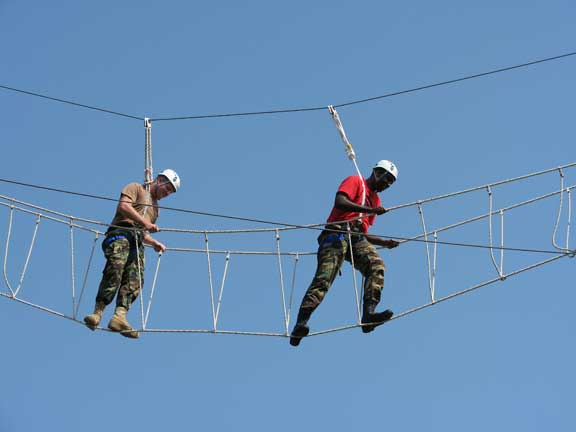
Sixth Class (high school freshman). Approximately 65-140 high school freshmen are admitted to New Mexico Military Institute each year.
Fifth Class (high school sophomore). A cadet must have completed five-and-one-half academic units that apply toward the high school diploma. English I must be one of the units submitted.
Fourth Class (high school junior). A cadet must have completed eleven academic units to include English I and II that apply toward the high school diploma.
Third Class (high school senior). A cadet must have completed seventeen academic units to include English I, II, and III that apply toward the high school diploma and have completed all but one unit in each of the core curriculum sequences.
Second Class (college freshman). A cadet must have a high school diploma or an equivalent from an accredited high school or a GED, and meet other minimum admissions requirements.
First Class (college sophomore). A cadet must have completed 32 academic units that apply toward the associate degree and one semester in residence at the college level.
Commandant of Cadets
|
^ TOP |
The Commandant of Cadets, similar to a Dean of Students, exercises command supervision over the Corps of Cadets. The Commandant and his staff monitor the activities of the Corps of Cadets 24 hours a day, seven days a week. The Commandant’s responsibilities include:
- Ensuring the security, safety, health and welfare, physical readiness, accountability, mentor-ship, and leader development of every cadet
- Maintaining a positive leadership environment and a culture of discipline in which each cadet can achieve academic excellence and physical readiness to maximize his/her potential.
- Establishing the military structured environment and overseeing the disciplinary system and disposition of disciplinary issues.
- Overseeing the military training, community service and interaction, extracurricular and intramural activities, entertainment and most activities affecting daily cadet life.
- Overseeing the Honor Code system run by the cadet Honor Board.
- Barracks assignment and maintenance.
- Overseeing all cadet services through the Deputy Commandants including the infirmary, Post Exchange, dining facility, barber shop, cadet store and laundry.
- Daniels Leadership Center, the Ropes, Leadership Reaction and Obstacle Courses.
- Cadet Counseling Center and services.
The Commandant is supported in his duties by two Deputy Commandants; three Squadron Leadership Advisors (SLAs); three Counselors including a Chaplain; a Leader Development Counselor/Instructor; Protocol, Cadet Activities and Entertainment Coordinator; an administrative office staff; the staffs of both Junior and Senior Army ROTC; the Campus Police, Medical Staff and the Troop Leadership Advisors (TLAs).
Troop Leadership Advisor
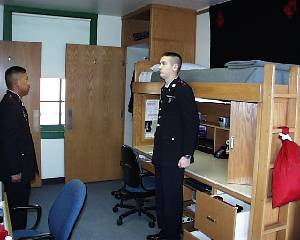
The Troop Leadership Advisor (TLA) is directly responsible for the safety, security, health and welfare, mentoring, counseling, leadership development, discipline and accountability of the cadets assigned to his/her troop. He/she is responsible for helping every cadet realize his/her full potential by maintaining a positive leadership environment in which every cadet can achieve academic excellence, become a leader of character and develop a desire for lifelong physical fitness. A TLA plays a crucial role in interacting with cadets on a daily basis to develop the “whole person”. The Troop Leadership Advisor (TLA) is a key member of the Commandant’s staff and the individual most knowledgeable of each cadet and the activities that he/she is involved with on campus. The TLA directly supervises the leadership development of those cadets assigned to the Troop and focuses on the maintenance of good order, discipline, and daily cadet life within their troop. The TLA enforces regulations, policies, and procedures directly impacting the morale, welfare, administration, activities and training of up to 80 cadets. The TLA works to cultivate a positive rapport and regular communication with cadets, parents, guardians and members of the faculty and staff.
Daniels Leadership Center
|
|
The Daniels Leadership Center (DLC)is a unique learning, instructional and experiential catalyst for the New Mexico Military Institute. Under the direction of the Commandant of Cadets, the Center is charged to advance the NMMI mission to educate, train and prepare young men and women to become leaders of character by supporting its academic and leadership curriculum that falls under the Dean of Academics. The focus of this effort derives from the unique nature of NMMI with its six-year integrated secondary and post-secondary learning curriculum and programs. This enables the Center to concentrate on students at the junior high and high school age level, as well as the junior college, in order to engage them in formal and experiential leadership learning.
The Center sponsors a variety of programs to include conferences, workshops, lectures, round-tables and summer camps. Integral parts of the Center are the Yates Leadership Challenge Complex and the Performance Enhancement Laboratory (PEL). The Complex is divided into two experiential courses that emphasize character and leadership development. The PEL is patterned after the Army’s Center for Excellence in Performance (ACEP) at the United States Military Academy at West Point (USMA).
NMMI’s PEL expands on that concept by offering unique and exciting training and learning opportunities for cadets. Using performance psychology training techniques, cadets learn how to use the tools of goal-setting, imagery, self-talk and visualization to enhance the skills of motivation, concentration/focus, self-confidence, stress management and arousal control to help perform optimally. Under the supervision of a professional with a Ph.D. in the Performance Psychology field, the PEL combines the best practices of traditional training along with the latest cutting edge science to accelerate the individual’s progress and ability to perform at one’s peak. The Leader Development Personnel at the DLC work closely with the staff and faculty in assessing the leadership development that occurs within the Corps of Cadets and through the entire NMMI experience.
Disciplinary System
New Mexico Military Institute provides a rewarding yet demanding learning environment which focuses on the “whole person.” Not everyone who applies can meet the challenges of the NMMI experience. Adherence to established standards by all cadets is at the core of leadership development and those standards must be met in order to remain a NMMI Cadet. The Institute reserves the right to dismiss, suspend, or otherwise penalize any cadet who does not properly adapt to academic, disciplinary and/or physical readiness requirements. Among the offenses that may result in suspension or dismissal are those considered to undermine the purposes, goals and mission of the Institute and compromise the standards of character and conduct expected of all cadets. These include: hazing or endangerment of any cadet; sexual misconduct; disgraceful or refractory behavior; use or possession of illegal drugs and drug paraphernalia and misuse of prescription drugs; alcohol or tobacco products; possession of weapons, knives or explosive devices; unexcused absences; or any conduct that may bring discredit upon the Institute. NMMI Policy documents, Commandant Policy letters, the Blue Book, and the NMMI Operations and Procedures Manual provide in detail the policies pertaining to the aforementioned offenses.
Lesser offenses will result in demerits, marching tours (punishment), loss of privileges and/or restriction to the campus. An excessive number of demerits is regarded as a failure or inability to adjust satisfactorily to the NMMI standards and may result in disciplinary probation or suspension. Poor academic performance may also result in academic probation or suspension.
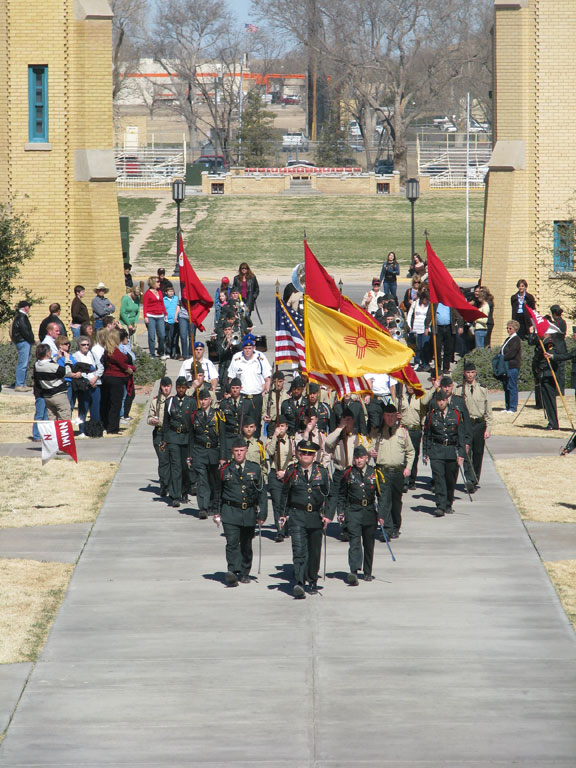
The Honor Code and Honor System of the Corps of Cadets at NMMI belong to the Corps of Cadets and operate under the sanction of the Commandant of Cadets. The Cadet Honor Code and System, adopted in 1921 by a unanimous vote of the Corps of Cadets, is officially recognized as the primary means by which character development is accomplished at NMMI. Simply stated: A cadet will not lie, cheat, steal, nor tolerate those who do. Every cadet is obligated to support and enforce the Honor System. Violations of the code may result in serious disciplinary action, suspension or dismissal based on the recommendations of the Cadet Honor Board/Committee as finally determined by the Commandant of Cadets. New cadets are fully trained in all aspects of the Honor System, and prospective cadets are encouraged to consider carefully the implications of intolerance before joining the Corps. The Cadet Honor Manual details policies pertaining to violations of the Cadet Honor Code
The normal repeat policy for NMMI is to grant credit only for the highest grade. However, if a cadet taking a college course is found in violation of the honor code by cheating, the cadet will receive a grade awarded by the instructor (normally an “F” grade) for that course. Any repeat of that course will be assigned both grades (no academic forgiveness) for the GPA. Thus a cadet may receive both the “F” and any subsequent letter grade earned.
A furlough is a designated and authorized time when a cadet may leave NMMI overnight. Authorization for furloughs is directly related to class status, activities on the training schedule, academic grades and deportment grade. A cadet whose grades or deportment fall below a “C” average loses his/her furlough privilege. Furloughs are taken only on specific weekends designated by the Commandant of Cadets. There are three major furloughs during which all cadets must leave NMMI, Thanksgiving, Christmas, and Spring Break. The barracks and facilities are closed during these extended break periods.
Toles Learning Resources Center
The purpose of the Center is to offer programs, activities, and strategies to support and enable cadets to experience academic success, maximize learning potentials, produce high quality work, succeed in a multi-cultural world, and be prepared for a full range of options and opportunities for their future. Help and resources will be available in developing time management skills, reading and writing enhancement, math strategies, general study skills, ACT/SAT preparation, and preparation for furthering their education. Formal course, group seminars, individualized help, and intern programs will be offered to help cadets reach their academic and life goals. In time, many of these programs and facilities will be offered to a larger audience through out-reach to the Roswell community and beyond. Technology will be used to offer distance education programs which will enhance what NMMI can offer not only our cadets, but also our faculty, staff, and community.
Godfrey Athletic Center
|
^ TOP |
Physical Performance and Development
The Godfrey Athletic Center supports this mission in the following ways:
- A student activity center
- The Outdoor Fitness Factory
- The Varsity Strength & Speed Training Center
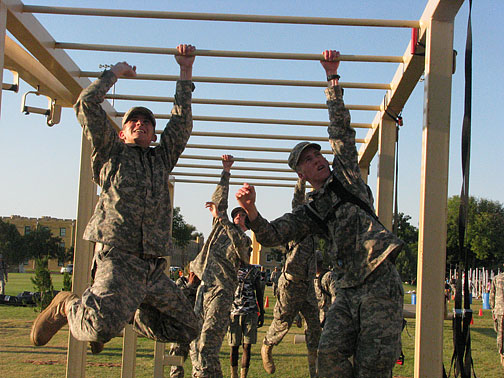
- Athletic Training Education Center
- An athletic practice and competitive venue
- Leadership assessment
Physical Development
The Outdoor Fitness Factory (OFF) is a world class facility that accommodates the large volume demands of the Corps Physical Development program, while providing unparalleled exercise variety. It features a wide range of training venues that facilitate optimal physical development. The Outdoor Fitness Factory accommodates the multiple training needs and philosophies of all campus groups such as Corps PT, Academy Prep PT, SROTC PT, and the Bronco/Colt Athletic Teams. The OFF is truly innovative featuring 2 sand pits, a Speed Hill @ 3% grade, 56 Multi-stations, a Medicine Ball Wall and Vertical Power Station, 4 Inverted Bear Crawl Standards, 1 Platoon Trainer - Mobile Exercise Station, along with numerous other pieces of equipment including barbells, medicine balls, kettle-bells, sand bags, water filled kegs, tractor tires, weighted barrels, power sleds, elastic bands, weighted belts, and plyo-boxes.
Athletic Training Education Center
The Athletic Training Education Center (ATEC) provides top level physical rehabilitation and treatment facilities for cadets suffering from sports related injuries. The ATEC sets the standard for facilities and treatment at this level. The ATEC serves primarily athletes, but is also available as a resource to cadets. Additionally, ATEC functions as the primary education center for cadets wishing to pursue a career in the athletic training and sports medicine fields. The recently completed center offers the highest quality cutting edge therapeutic modalities under the direction of two full-time athletic training professionals.
Athletics
The Athletic Department fields competitive athletic teams at both the intercollegiate and interscholastic levels. NMMI fields 10 intercollegiate teams that compete at the National Junior College (NJCAA) Division I level in the following sports:
Men :
- Baseball
- Basketball
- Football
- Golf
- Tennis
Women:
- Cross-country
- Golf
- Tennis
- Track
- Volleyball
NMMI fields high school interscholastic teams that compete in the New Mexico Activity Association (NMAA) and the “AAA” and “AA” level in the following sports.
Boys
- Basketball
- Baseball
- Cross-country
- Football
- Golf
- Track
- Soccer
Girls
- Basketball
- Cross-Country
- Track
- Volleyball
Cadet Store
The NMMI Cadet Store, located in Bates, has everything for current cadets and alumni. All required textbooks for NMMI courses are stocked as well as a full line of military uniforms and accessories. A collection of NMMI logo apparel and gifts, school supplies and computer accessories are available. Laundry and dry cleaning services are also offered through the Cadet Store. Visit the Cadet Store downstairs in Bates Hall or contact them at (575) 624-8215.
NMMI Golf Course
The NMMI golf course is a regulation 18 hole facility, equipped with a large driving range and putting green. The course plays 6639 yards from the back tees, 6315 yards from the middle tees, and 5275 yards from the forward tees. The greens are bent/poa annua and are usually fast. We over-seed in the fall to provide the golfers with lush green fairways, tees, green aprons.
NMMI Food Services
Commandant’s web section has a link to food services. Food Services runs the dining facility, Post Exchange snack bar and Game Room snack bar and lounge. From Food Services - “Your dining experience is more than great food. It is community experience centered on culinary expertise, fresh ingredients, healthy options and a shared sense of environmental and social responsibility. Our team is committed to creating the best possible dining experience. Join us to experience the comfort, convenience, outstanding food and inviting atmosphere designed especially for you.”
NMMI Auxiliary Services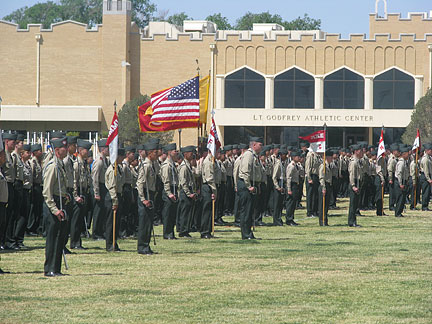
The NMMI Bowling Alley is located in Hinkle Hall, provides 10 lanes, with sound system and cosmic bowling available.
NMMI’s Internet Café/Game Room is located in Hinkle Hall. It provides wireless Internet service, a game room which includes Xbox games, a Pool Room, and 42” plasma TV’s for cadets.
The NMMI Barbershop is located in Hinkle Hall and open five days a week. Two barbers/cosmetologists are employed at the Barbershop to provide professional service.
NMMI’s Post Office is located on NMMI campus in Hinkle Hall and provides services to all cadets and NMMI administrative offices.
NMMI Infirmary
The campus Marshall Infirmary has a capacity of 38 beds and the capability of treating cadets for minor illnesses and injuries. A nurse is on duty 24 hours a day and is available during the school day and for sick call. Morning sick call begins at 7:00 a.m. Monday through Friday.
Routine medical and dental care should be arranged by you during school breaks with your local provider. Minor illnesses are treated or referrals are made to Roswell physicians if deemed necessary by the medical staff. There is no charge for an office call or for confinement at the Infirmary, however, you will be billed for any lab tests. Prescribed drugs are charged to the cadet account; copies are available for insurance purposes.
In instances of sudden serious illness or accident, cadets are transported to Eastern New Mexico Medical Center in Roswell by ambulance.
Registrar’s Actions
Confidentiality of Student Records (FERPA)
Student records are accessed by faculty and professional staff for authorized academic-related purposes. The release of student records for off-campus use occurs only with a student’s knowledge and consent, or when required by law.
A student’s high school record is open for inspection by the student’s parents or guardians. College students and high school students taking college courses (college courses only) fall under FERPA regulations and can limit access to their record as specified in federal law. Financially, New Mexico Military Institute considers all students, whose parents provide any portion of their expenses (verified information), as “dependent” as defined by Internal Revenue Code of 1954, Section 152 (for form 1098s). The cadet must provide proof of “independent” status to the Registrar prior to the start of the third academic week. College cadets must elect whether or not their grades go to their parents through their matriculation form, or an invitation page inside of the student portal, “Self-Service”.
The Registrar is the custodian of the student’s academic record. A student’s academic record may include application for admission information, residency certificate, immunization certificate, date of school entry, student schedules and schedule changes, academic work completed, standardized achievement test scores, transcripts from previous schools attended, and various Veteran’s Administration forms.
Public information which may be released upon request includes a student’s name, photograph, address, telephone number, truncated date and place of birth, area of concentration, dates of attendance, height, weight, scholastic and/or athletic achievement, degree (if any), previous schools attended and date of graduation. If a student does not wish for this public information to be released, he/she must so notify the Registrar during the first two weeks of classes in each semester. This is normally done during matriculation.
Cadets have the right to inspect and review their educational records within 45 days of the date of their request, but must specify which educational records. They have the right to request amendment of the records they believe to be in error. They can file a complaint with the Academic Dean, Registrar, or US Department of Education if they determine their rights have been violated. The address for such complaints is at the Registrar’s Office or available via the intranet.
FERPA Annual Notice to Reflect Possible Federal and State Data Collection and Use
As of January 3, 2012, the U.S. Department of Education’s FERPA regulations expand the circumstances under which your education records and personally identifiable information (PII) contained in such records — including your Social Security Number, grades, or other private information — may be accessed without your consent. First, the U.S. Comptroller General, the U.S. Attorney General, the U.S. Secretary of Education, or state and local education authorities (“Federal and State Authorities”) may allow access to your records and PII without your consent to any third party designated by a Federal or State Authority to evaluate a federal- or state-supported education program. The evaluation may relate to any program that is “principally engaged in the provision of education,” such as early childhood education and job training, as well as any program that is administered by an education agency or institution. Second, Federal and State Authorities may allow access to your education records and PII without your consent to researchers performing certain types of studies, in certain cases even when we object to or do not request such research. Federal and State Authorities must obtain certain use-restriction and data security promises from the entities that they authorize to receive your PII, but the Authorities need not maintain direct control over such entities. In addition, in connection with Statewide Longitudinal Data Systems, State Authorities may collect, compile, permanently retain, and share without your consent PII from your education records, and they may track your participation in education and other programs by linking such PII to other personal information about you that they obtain from other Federal or State data sources, including workforce development, unemployment insurance, child welfare, juvenile justice, military service, and migrant student records systems.
Name Changes
Name changes are only accepted with proper legal/court documents. NMMI will correct the record as requested, but will maintain former names for record keeping inside the student database.
Transcripts and transcript requests
Transcript requests must be in writing. For cadets over 18 or enrolled in college work, the request must come from the individual whose name is on the transcript. Parents may request transcripts on high school cadets who are not enrolled in college. Transcript request forms are in the Registrar’s office or can be found on the registrar web site - http://www.nmmi.edu/reg/. NMMI now uses an ordering service, for transcripts which is tied to scrip-safe’s electronic transcripts used by over 1800 schools worldwide.
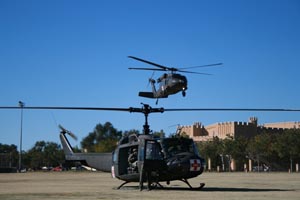 NMMI enrolls a number of cadets who drill with National Guard and reserve units (six-year or longer contracts) making them eligible for Chapter 1606 VA benefits. NMMI also grants credit for basic and advanced training, and for certain MOS training applicable to NMMI coursework. Chapter 30, 33, 35 and 1607 benefits are also available. In all cases, student will submit a request for benefits application directly to the VA (gibill.gov website) and NMMI will submit the educational information directly to the VA for the benefit. Except for Chapter 33 benefits, monies are deposited directly to the student according to the student’s VA application and the student (and/or parent) is responsible for all fees/expenses to NMMI. Chapter 33 pays tuition and fees directly to NMMI and the remainder (books and living expenses) go to the student. NMMI asks for (as applicable), the application to VA, DD 214’s, contract, NOBE and the Certificate of Eligibility before submitting the educational portion of the record. If a cadet has attended another school prior to NMMI, they have the first semester to get a copy of that official record to NMMI, and without that record educational forms (1999) NMMI will not submit the second term educational record. NMMI enrolls a number of cadets who drill with National Guard and reserve units (six-year or longer contracts) making them eligible for Chapter 1606 VA benefits. NMMI also grants credit for basic and advanced training, and for certain MOS training applicable to NMMI coursework. Chapter 30, 33, 35 and 1607 benefits are also available. In all cases, student will submit a request for benefits application directly to the VA (gibill.gov website) and NMMI will submit the educational information directly to the VA for the benefit. Except for Chapter 33 benefits, monies are deposited directly to the student according to the student’s VA application and the student (and/or parent) is responsible for all fees/expenses to NMMI. Chapter 33 pays tuition and fees directly to NMMI and the remainder (books and living expenses) go to the student. NMMI asks for (as applicable), the application to VA, DD 214’s, contract, NOBE and the Certificate of Eligibility before submitting the educational portion of the record. If a cadet has attended another school prior to NMMI, they have the first semester to get a copy of that official record to NMMI, and without that record educational forms (1999) NMMI will not submit the second term educational record.
Residency and Residency Requirements
Enrollment at NMMI is in itself not sufficient to change residency, and NMMI will classify a cadet based on his/her residency at the time of admission. Per state law, any action which will bring into question residency must be resolved. Legal residency is the person’s permanent home, which requires a physical presence coupled with an intent to remain and make that location/state one’s permanent home. An individual only has one residence at a time, and retains the former residence until all items are met in the new residence (license, voting, home, living expenses, etc.). At the time of first enrollment, residency is determined by the census date and anyone not meeting residency requirements will be classified as a nonresident. An individual’s classification remains as determined at first enrollment, as long as he/she is a continuing cadet, unless the registrar’s office has knowledge of a circumstance calling for a reclassification.
An individual is considered a resident if he/she has lived in New Mexico for over one year (NM physical location). An individual may become a resident of New Mexico through certain steps, but must complete those steps with one year residency before the cadet’s status changes to resident. NM HED site has the NM State Law on residency information, petitions and exceptions to the law. 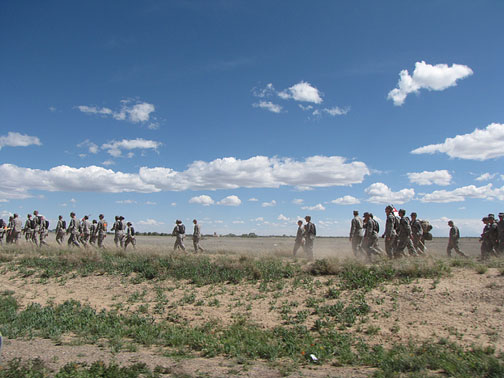
Persons under 18 are considered minors under NM law and the residence is presumed to be the same as their parents’. Cadet must be at least 19 years old to establish residency apart from their parents. Only individuals who are financially independent may establish residency, and if the cadet is under the age of 23, a copy of the parents’ 1040 or 1040A US income tax form will be required to show dependency status in the previous tax year.
Requirements to establish NM residency are:
- Twelve month residence in New Mexico (consecutive).
- Financial independence to establish residency (see above)
- Written declaration of intent to relinquish residency in any other state to the registrar’s office
- Overt Acts (at least two of these items):
- If employed, employment within New Mexico (parents);
- Payment of NM income taxes;
- NM drivers’ license;
- NM vehicle registration;
- NM voter registration;
- NM high school transcript confirming attendance/graduation;
- Proof of current residential property ownership in New Mexico;
- Current utility bills showing applicant name and a New Mexico address;
- No act inconsistent with being a NM resident, e.g., voting in another state.
Waivers of non-resident tuition/12-month duration:
- Parent has moved to NM for and has permanent full-time employment;
- Active duty service members’ dependents while stationed at a military base inside of New Mexico;
- Active members of the NM National Guard (participating members) and their dependents;
- Dependents of individuals who move to NM for retirement (proof required);
- Athletes (college only) receiving state-funded athletic scholarships. (Out-of-state paying in-state rates);
- Funded service academy preps (out-of-state paying in-state rates);
- Waivers granted by the Board of Regents.
From the NM HED Residency brochure (http://hed.state.nm.us/uploads/files/Residency.pdf)
“An individual must establish legal residency in New Mexico before he or she is entitled to pay in-state tuition rates. The requirements to establish residency for tuition purposes are independent from those of other types of residency such as voting or holding public office.”
“New Mexico institutions of higher education are supported by the General fund of the State of New Mexico. Since non-resident students (and their families) generally have not contributed to the support of public education in New Mexico, they are required to pay additional tuition which more closely represents the actual cost of their education.”
All NMMI cadets reside in the barracks.
J. Penrod Toles Learning Center Building
Opened in 1985, this modern facility combines the traditional architecture of the campus with modern functions, aesthetics, and technology. As a focal point of the Institute’s academic life, the Learning Center is the home of Paul Horgan Library, Toles Learning Resources Center, Writing Center, College and Career Center, Mabee Lecture Hall, and Information Systems, Communications, and Technology.
For more information and an introduction to our resources, please visit the Library’s website: http://www.nmmi.edu/library/
Writing Center
The Writing Center provides assistance to every cadet who needs assistance with his/her writing. Cadets learn about the writing process and receive instructions on how to improve their writing skills. They receive instruction on any part of the writing task - from planning to write to checking on correct grammar and usage conventions. The center is open during night study hall, and in the mornings from 0715 to 0750.
Franklin Student Assistance Center
The Franklin Student Assistance Center, houses high school Academic Advising. The Division serves as a focal point for all high school academic advising, career development and testing information.
Academic Advising and College Placement
New Mexico Military Institute has a centralized advising system for high school cadets located in the Franklin Student Assistance Center (SAC), and a faculty advising system for college cadets. A system of developmental advising is implemented for high school cadets whereby the advisor assists through a series of advising sessions the cadet in identifying personal and educational goals. Beginning in the Sixth Class year, advisors introduce cadets to time management and study skills, goal-setting and interest inventories, advancing to the Fifth Class to begin standardized test taking with the mandatory PLAN test. The Fourth Class begins the college planning process, identification of potential majors and search for appropriate colleges. Additionally, juniors take the PSAT, ACT, TOEFL and SAT, if desired. College plans and applications are finalized in the Third Class year culminating in final college choices, applications, scholarship searches and final testing.
Each cadet is assigned an academic advisor upon enrollment at New Mexico Military Institute. Each high school advisor/counselor is responsible for one high school grade level, moving progressively with that class from sixth class to graduation.
Academic Advisors work closely with Troop Officers to mentor, counsel, advise and advocate for the cadets, establishing a rapport and a caring attitude toward them and providing support for them as they learn to deal with the obligations in academics and in the Corps of Cadets, as well as the pressures of being away from home. Academic Advisors act as a resource person providing information on a myriad of topics such as course requirements, learning resources, job markets and selection of colleges after NMMI. They are a liaison between the parents and the teaching faculty, Commandant’s Office and Counseling Center to help assure that the cadet is given every avenue available to succeed. Finally, they coordinate preparation of the cadet’s graduation plans and provide guidance to the cadet in the achievement of individuals academic goals.
Specialists in personal counseling and academic guidance and counseling are available to all cadets. They provide cadets with career and educational information as well as administer and interpret achievement tests and interest inventories. The New Mexico Military Institute serves as a regional test center for Educational Testing Service’s testing programs (PSAT, SAT I, SAT II, GRE. TOEFL AND CLEP) and the American College Testing Program. (PLAN and ACT). The Student Assistance Center maintains these regularly updated materials for cadet use: general and specialized college guides and directories, a computerized “ACT’s DISCOVER” program on colleges, careers and financial aid; college catalogs and view books, books and pamphlets; video cassette materials; general and specialized financial aid guides and directories; college admissions and recruiting materials; admission application materials for schools regularly attended by New Mexico Military Institute graduates; and specialized guidance materials for preparation for professions.
Cadet Counseling Center
The Cadet Counseling Center (CCC) provides cadets advice, counsel, and encouragement in the areas of human interaction, interpersonal relationships, personal growth, spiritual growth, social awareness, and intellectual achievement. It provides cadets with a person who will listen and give feedback on a wide variety of issues. CCC is located in JRT near the PX.
The personnel of the CCC help the cadets deal with family matters, roommate problems, tobacco/alcohol involvement, homesickness, personal attitude, Corps life, authority, ethical/moral issues, depression, anxiety, eating problems, isolation, conformity to discipline and basic adjustment problems. If the cadet needs more specialized or long term counseling than the Cadet Counseling Center can provide, referrals are made to appropriate medical, legal or social professionals at the Cadet’s expense. Psychiatric services are not available through the CCC.
The CCC is part of the Commandant’s Crisis Action Team, a team of various professionals who work together in the event of a crisis. They also are available to counsel cadets in the case of death in the family, loss of home to fire, or various other crises which may arise.
The CCC staff maintains close cooperation and coordination with the Academic Advisors, Commandant’s staff which includes the Deputy Commandants for Operations and Support, Squadron Officers and most importantly Troop Officers, Staff and Faculty, and Cadet Regimental Staff in addressing concerns of the cadet’s educational, social, and personal development.
Each week the CCC staff, the Commandant, and the Deans meet or exchange information to identify ways to help cadets succeed.
|








 NMMI enrolls a number of cadets who drill with National Guard and reserve units (six-year or longer contracts) making them eligible for Chapter 1606 VA benefits. NMMI also grants credit for basic and advanced training, and for certain MOS training applicable to NMMI coursework. Chapter 30, 33, 35 and 1607 benefits are also available. In all cases, student will submit a request for benefits application directly to the VA (gibill.gov website) and NMMI will submit the educational information directly to the VA for the benefit. Except for Chapter 33 benefits, monies are deposited directly to the student according to the student’s VA application and the student (and/or parent) is responsible for all fees/expenses to NMMI. Chapter 33 pays tuition and fees directly to NMMI and the remainder (books and living expenses) go to the student. NMMI asks for (as applicable), the application to VA, DD 214’s, contract, NOBE and the Certificate of Eligibility before submitting the educational portion of the record. If a cadet has attended another school prior to NMMI, they have the first semester to get a copy of that official record to NMMI, and without that record educational forms (1999) NMMI will not submit the second term educational record.
NMMI enrolls a number of cadets who drill with National Guard and reserve units (six-year or longer contracts) making them eligible for Chapter 1606 VA benefits. NMMI also grants credit for basic and advanced training, and for certain MOS training applicable to NMMI coursework. Chapter 30, 33, 35 and 1607 benefits are also available. In all cases, student will submit a request for benefits application directly to the VA (gibill.gov website) and NMMI will submit the educational information directly to the VA for the benefit. Except for Chapter 33 benefits, monies are deposited directly to the student according to the student’s VA application and the student (and/or parent) is responsible for all fees/expenses to NMMI. Chapter 33 pays tuition and fees directly to NMMI and the remainder (books and living expenses) go to the student. NMMI asks for (as applicable), the application to VA, DD 214’s, contract, NOBE and the Certificate of Eligibility before submitting the educational portion of the record. If a cadet has attended another school prior to NMMI, they have the first semester to get a copy of that official record to NMMI, and without that record educational forms (1999) NMMI will not submit the second term educational record.